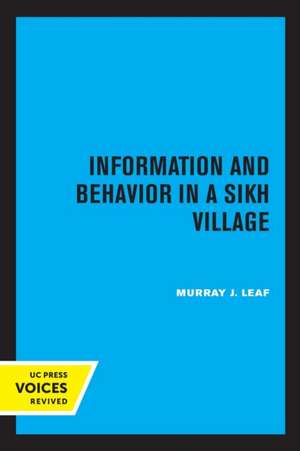Information and Behavior in a Sikh Village – Social Organization Reconsidered
Autor Murray J. Leafen Limba Engleză Paperback – 28 apr 2022
| Toate formatele și edițiile | Preț | Express |
|---|---|---|
| Paperback (1) | 393.47 lei 6-8 săpt. | |
| University of California Press – 28 apr 2022 | 393.47 lei 6-8 săpt. | |
| Hardback (1) | 563.49 lei 6-8 săpt. | |
| University of California Press – 28 apr 2022 | 563.49 lei 6-8 săpt. |
Preț: 393.47 lei
Nou
Puncte Express: 590
Preț estimativ în valută:
75.31€ • 81.84$ • 63.30£
75.31€ • 81.84$ • 63.30£
Carte tipărită la comandă
Livrare economică 21 aprilie-05 mai
Preluare comenzi: 021 569.72.76
Specificații
ISBN-13: 9780520307834
ISBN-10: 0520307836
Pagini: 314
Dimensiuni: 158 x 239 x 18 mm
Greutate: 0.46 kg
Editura: University of California Press
ISBN-10: 0520307836
Pagini: 314
Dimensiuni: 158 x 239 x 18 mm
Greutate: 0.46 kg
Editura: University of California Press
Notă biografică
Murray J. Leaf is Professor of Anthropology and Political Economy at The University of Texas at Dallas.
